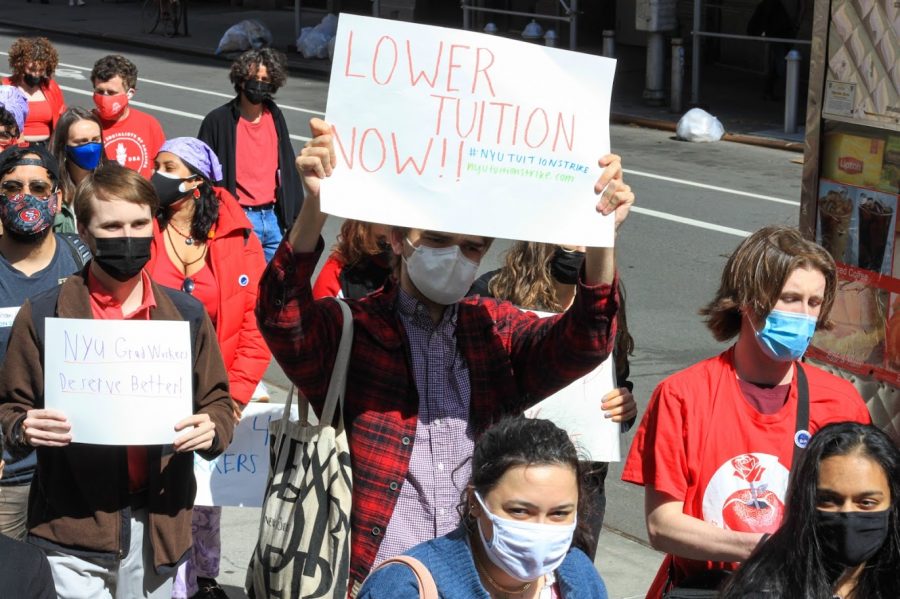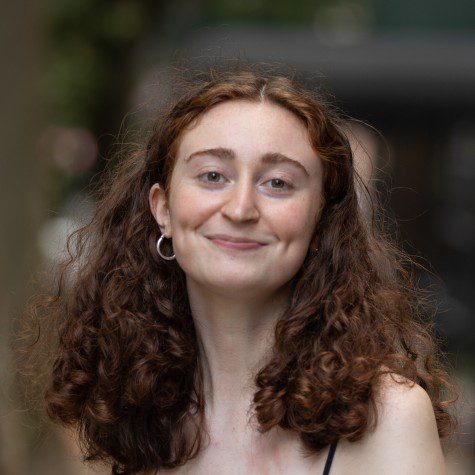NYU YDSA halts fall 2021 tuition strike, plans instead for Spring 2022
After calling off its original fall 2021 tuition strike, the NYU chapter of the Young Democratic Socialists of America is encouraging students to stop paying tuition for the spring 2022 semester.
NYU’s chapter of the Young Democratic Socialists of America announced its Fall 2021 tuition strike on April 30. However, the group recently called off its tuition strike for the Fall 2021 semester and now plans to organize another strike for Spring 2022. (Staff Photo by Alexandra Chan)
September 3, 2021
NYU’s chapter of the Young Democratic Socialists of America has called off its tuition strike for the fall 2021 semester. Instead, the group is now regrouping and reorganizing for another strike for spring 2022.
NYU YDSA first announced the fall 2021 strike on April 30, citing repeated tuition increases, alleged anti-labor practices, and the university’s response to the COVID-19 pandemic as some of the main justifications for the strike. The organization encouraged students to withhold tuition payments for the fall semester and asked alumni to not give donations to the university.
A pledge to join the action garnered over 750 signatures in less than one week, according to an email to chapter members, and now stands at around 856 digital signatures as of Sept. 2 — approximately 3% of the 29,700 undergraduate students currently enrolled at the university.
NYU YDSA said it decided to suspend the fall strike for a variety of reasons, including a short time frame before tuition payments were due and a turnover in chapter leadership at the end of the 2020-21 academic year.
“Between all of our members being scattered to the wind with the summer, and what frankly ended up being burnout towards the end of the spring and the beginning of summer, it derailed what was a successful start,” Gallatin junior Campbell Munn, who serves as a campaign coordinator for NYU YDSA, said.
NYU YDSA’s fall tuition strike was originally inspired by Columbia-Barnard YDSA’s tuition strike, which ended in April. According to Munn, both organizations will host simultaneous actions next spring.
“Hopefully, there is a strength in numbers,” he said. “It would certainly be powerful if the two marquee Manhattan universities were on tuition strikes at the same time. And to require the students to essentially finance NYU’s rapid expansion and growth into an ostensible real estate empire is putting the onus on the wrong people — it’s too much of a burden at this point.”
When the strike was first called, NYU YDSA included a list of demands for the university. These included a reduction in the cost of attendance, increased financial aid, good-faith bargaining with unions, an end to inequitable university expansion, a severance of ties with the New York City Police Department, and a commitment to a fair and transparent use of NYU’s endowment and investments.
In its initial press release, NYU YDSA alleged that a higher portion of NYU’s yearly operating revenue comes from undergraduate student tuition than at its peer institutions — and that the university has no plans to stop raising tuition or repaying debt from property expansion at the expense of students. NYU increased undergraduate tuition by 2.95% for the 2020-21 academic year and by 3% for the current 2021-22 academic year.
“There are a whole litany of reasons for why NYU failed during COVID response — the fact that there was no halt in tuition increases, even throughout the pandemic, and NYU stuck to planned increases,” Munn said.
Munn explained that holding a tuition strike in the spring would give NYU YDSA time to organize in person over the next four months and allow for more students to sign the pledge.
Karishma Chari, a CAS junior and YDSA campaign coordinator, added that the organization can now focus on engaging more graduate students. Recruitment for the fall tuition strike overlapped with the spring 2021 strike of the Graduate Student Organizing Committee — the union representing graduate student workers at NYU.
“One of the main demands that was dropped in the GSOC strike was tuition waivers for masters students,” Chari said. “If we had organized to strike this fall, I think a lot of those masters students who were organizing and on the ground with GSOC would have been egregiously burnt-out. Now, we can tap into this huge demographic who are equally frustrated and underrepresented.”
Chari also emphasized the frustration felt by students who were not awarded the fall 2021 COVID-19 Relief Grant despite a university announcement that all funding had been distributed.
“We’ve used this to help our messaging and let people know that they can take the frustration out on NYU in striking for the spring semester,” Chari said. “We ended up getting a 15% bump in our signatories. But late August is when we’re really going to start taking this into overdrive.”
NYU YDSA already began promoting their spring 2022 strike at Washington Square Park on Aug. 29 and is in the process of planning further actions.
Tandon sophomore Krish Sagar, who receives a significant amount of financial aid, said he is nervous of losing the assistance if he does not pay the balance of his tuition. He has yet to decide whether he should strike during the spring semester.
“For people that have the means to, I think the strike is good — NYU needs to be held accountable somehow, and they can’t ignore a large group of people who refuse to pay tuition until their needs are met,” Sagar said. “The administration does a lot of things to maintain the absurd amount of money they get and will do anything to keep that, yet not support their students the amount that they should.”
Anthony Cruz, a Steinhardt junior and vice-chair of the Student Government Assembly Presidents Council, shared Sagar’s concern. The majority of Cruz’s tuition is also covered by financial aid, so he did not sign the petition for the fall as it may impact his grants. Instead, he will support the action in the spring in any other capacity.
The SGA released a letter in support of the fall tuition strike in May, and plans to send out another statement in the near future, according to Cruz.
“As students, asking for how our tuition money is spent should not be this pipe dream,” Cruz said. “This year, there were specific recommendations made [by the SGA] in regards to not increasing tuition, or increasing financial aid in proportion to the amount that tuition increases by. I think that having both sides of the situation coming at NYU administration — an institute within the institution advocating for it, and then YDSA with more of community-based organizing from the outside — that there’s a greater chance for there to be some movement.”
A Stern sophomore who requested anonymity signed the petition for the fall semester and is in support of the strike, but will not be able to participate in the spring because their parents are helping pay their tuition and are nervous about the university disenrolling them from classes.
“For a lot of students who are getting help with their tuition, it’s not fully in their control, and for the ones who are paying on their own, it’s definitely still a risk assessment on whether it’s worth being de-enrolled from classes they need,” they said. “NYU raising tuition consistently, even amid a pandemic, has proven the need for movements like the one the YDSA is trying to start. The NYPD ties, union negotiations and reducing the cost of attendance are issues NYU has refused to address, despite the fact that they are in no way unreasonable.”
Izzy Vieira, a CAS senior and the incoming president of NYU’s Politics Society, is skeptical of the tuition strike’s effectiveness, as she does not believe the university will lower tuition costs.
“The people who would be most willing to participate are people who are on some kind of financial aid, but are also the same people who are scared of losing that aid,” Vieira said. “And a lot of people have their parents paying their tuition, so I can’t see a lot of people convincing their parents to not pay. NYU is notorious for being so expensive, which is why I think the focus should be on the lack of financial aid.”
If the strike gains traction, Vieira speculated that NYU could potentially distribute more financial aid grants and lower the percentage of how quickly tuition increases per year.
“I could see NYU talking to specific students who are having issues and then be more open to help them get more aid,” Vieira said. “There’s a lot of people who pay full tuition and have no issues with that, so I don’t see it affecting everyone’s tuition overall.”
Munn also emphasized that while the strike was called due to NYU YDSA’s discontent about the university’s measures to increase affordability, accountability and transparency, the issue of student debt is a broader issue that can only be resolved by comprehensive systemic change.
“If President Biden isn’t going to cancel our student debt, we’re going to try and act as such so we don’t accumulate so much debt — through tuition cuts, halts in the raising of tuition and more leniency with the way NYU works,” Munn said.
Contact Rachel Cohen at [email protected].

























































































































































